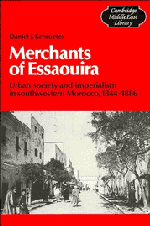Book contents
- Frontmatter
- Contents
- List of illustrations
- Map 1 General map of Morocco
- Preface
- Notes on usage
- Abbreviations
- Chronology
- 1 Introduction
- 2 The royal port
- 3 Merchants of the Sultan
- 4 Port and bazaar
- 5 Beyond the walls
- 6 The politics of trade
- 7 Foreign intervention and domestic reforms
- 8 The struggle for the southwest
- 9 The people of Essaouira in precolonial times
- 10 The end of an era
- Appendix A Corcos collection: nineteenth-century Arabic documents (1843–83)
- Appendix B Population estimates of Essaouira
- Appendix C Balancing revenue and expenditure: accounts of the port
- Appendix D Trade statistics for Essaouira
- Notes
- Bibliography
- Index
- Frontmatter
- Contents
- List of illustrations
- Map 1 General map of Morocco
- Preface
- Notes on usage
- Abbreviations
- Chronology
- 1 Introduction
- 2 The royal port
- 3 Merchants of the Sultan
- 4 Port and bazaar
- 5 Beyond the walls
- 6 The politics of trade
- 7 Foreign intervention and domestic reforms
- 8 The struggle for the southwest
- 9 The people of Essaouira in precolonial times
- 10 The end of an era
- Appendix A Corcos collection: nineteenth-century Arabic documents (1843–83)
- Appendix B Population estimates of Essaouira
- Appendix C Balancing revenue and expenditure: accounts of the port
- Appendix D Trade statistics for Essaouira
- Notes
- Bibliography
- Index
Summary
The town of Essaouira, better known as Mogador to Europeans, is today a quiet, slow-paced, and relatively isolated fishing town. Most of the population of the town still resides within the medina, the area enclosed by ramparts which once constituted the city limits. The quaintness of the town today seems to contrast with its former position as a royal port. This is still marked by its formidable ramparts and rows of cannons which point outwards to the land and sea. In the eighteenth and nineteenth centuries, Mogador was among the few places along the North African littoral (called the ‘Barbary Coast’ by Europeans) known to foreign traders, sailors and adventurers. Its fame rivalled that of Algiers, Tunis and Tripoli.
From the 1770s through the 1870s, Essaouira was the most active seaport of Morocco. This present study is about the history of Essaouira from 1844 to 1886, the heyday of the town as an international port. These two dates mark crucial events in Moroccan history and in the life of Essaouira. In 1844, the town was bombarded by the French fleet, a punitive operation to deter Morocco from further involvement with the Algerian resistance movement along her eastern frontier. From that date on, Morocco had to recognize foreign intervention as a major factor in the life of the country.
- Type
- Chapter
- Information
- Merchants of EssaouiraUrban Society and Imperialism in Southwestern Morocco, 1844–1886, pp. xi - xviPublisher: Cambridge University PressPrint publication year: 1988



